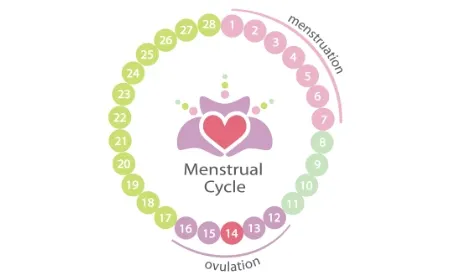Understanding Ovulation Bloating and How to Deal With it

Many women notice changes in their bodies throughout their menstrual cycle, and one common but often confusing symptom is bloating during ovulation. You may find yourself asking, “Can ovulation cause bloating?” The answer is yes — for many women, ovulation bloating is a real and sometimes uncomfortable part of the cycle. Understanding why this happens and knowing how to manage it can help you feel more in control of your body. In this article, we’ll gently explore what causes bloating during ovulation and share simple, practical ways to ease the discomfort.
- Why does Bloating Happen?
- What is Ovulation and When Does It Occur?
- Is Bloating During Ovulation Normal?
- Causes of Bloating During Ovulation
- How Long Does Bloating During Ovulation Last?
- The Difference Between Ovulation Bloating and Premenstrual Bloating
- Can Bloating After Ovulation Indicate Pregnancy?
- Other Symptoms That May Occur With Ovulation Bloating
- Ways to Alleviate Bloating During Ovulation
Why does Bloating Happen?
Bloating is a common symptom experienced by many women during their menstrual cycle, predominantly before a period and around the ovulation period. It happens due to a surge in hormone levels, which causes fluid retention and increased gas in the digestive system. The swelling and tightness felt in the abdominal region is an apparent sign of bloating around ovulation, often causing discomfort during ovulation. Understanding why bloating occurs is the first step to finding a solution to this discomfort.
What is Ovulation and When Does It Occur?
Ovulation is a key stage in the menstrual cycle when a mature egg is released from the ovary, usually around the middle of the cycle — about 10 to 16 days before the start of the next period. This is the time when a woman is most fertile. Along with this natural process, many women experience physical changes such as bloating and cramps during ovulation. These symptoms can be caused by hormonal shifts and fluid retention as the body prepares for a possible pregnancy. Ovulation bloating, in particular, is quite common and may feel like a swollen or tight belly. While some women may not notice any changes, others may find bloating during ovulation uncomfortable or even painful. Understanding these symptoms can help you better manage your cycle and recognise what’s normal for your body.

Is Bloating During Ovulation Normal?
Absolutely, experiencing bloating during ovulation is a normal physiological process that many individuals undergo. The fluctuation in hormones triggers ovulation discomfort, including symptoms such as bloating and cramps during ovulation. Understanding this bodily function can aid in managing these natural processes effectively.
Causes of Bloating During Ovulation
Let’s look at some common reasons why you experience bloating which leads to ovulation discomfort:
1. Hormonal Fluctuations
The significant hormonal shifts involving estrogen and progesterone during the menstrual cycle play a pivotal role in ovulation bloating. These fluctuations can influence the body's water retention capacity, leading to a bloated feeling. Understanding this physiological reaction can be a key element in managing discomfort during ovulation.
2. Increased Water Retention
Besides hormonal influences, other factors such as diet and lifestyle can exacerbate water retention in the body. This retention notably accentuates bloating around ovulation. Being cognizant of the increased tendency of water retention during this period can help in strategically managing one’s diet and fluid intake to lessen ovulation discomfort.
3. Digestive Issues
The hormonal changes occurring during ovulation can also affect the digestive system, leading to an increase in gas production and consequently, bloating. Addressing digestive health through probiotics or a fiber-rich diet might alleviate the discomfort during ovulation.
4. Alterations in Diet
Sudden changes in one’s diet can sometimes result in bloating during ovulation. Maintaining a balanced diet that includes a variety of nutrients can potentially ease the ovulation discomfort arising from dietary issues. It is advised that you have a well-planned diet to avoid bloating during this period.
5. Sensitivity to Foods
During ovulation, one might experience an increased sensitivity to certain foods that can trigger bloating. Identifying these foods and their intake can help manage bloating more efficiently. It might be beneficial to keep a food diary to identify and avoid potential triggers.
6. Physical Inactivity
A sedentary lifestyle can enhance the chances of experiencing bloating during ovulation. Engaging in regular physical activity, even mild exercises, can aid in reducing bloating and fostering a feeling of well-being. It is therefore recommended to maintain a steady routine of physical activity to combat ovulation discomfort.
How Long Does Bloating During Ovulation Last?
Bloating usually begins a few days before the onset of ovulation and may continue for a few days post-ovulation. On average, this discomfort lasts for about 3-5 days, though it can vary from individual to individual. It is crucial to observe one’s own cycle and note down the patterns to anticipate and manage ovulation discomfort adequately.
The Difference Between Ovulation Bloating and Premenstrual Bloating
It is important to distinguish between ovulation bloating and premenstrual bloating. While both can cause discomfort, they occur at different times in the menstrual cycle. Ovulation bloating happens around the time the egg is released, while premenstrual bloating occurs closer to the start of the menstrual period, mainly due to the hormone progesterone. Knowing the difference can aid in personal care and understanding the appropriate use of products for period protection.

Always caters to all your period management needs with their stellar range of sanitary pads and tampons. Whatever be your requirement, trust Always to have it covered. For instance, those comfortable with pads can try the Maxi Thick pads which are designed with an innovative extra-absorbent core, rest assured that you will stay protected for hours at a stretch. It comes equipped with a comfortable flexi pillow and dry top sheet that offers extra comfort so that you always stay fresh, clean, and lively.
Alternatively, those who prefer using tampons can explore Always’ Tampax tampons. The Tampax Compak tampons, in particular, are a great option as they come with a smooth, compact applicator for discretion, and a built-in protective skirt to help prevent leakage for up to 8 hours. Moreover, they’re available in different absorbency variants – Lite, regular, Super and Super Plus - so you can pick one that suits your flow.
Can Bloating After Ovulation Indicate Pregnancy?
Bloating after ovulation can be caused by several factors, and while it may be an early sign of pregnancy for some women, it’s not a guaranteed indicator. After ovulation, the hormone progesterone rises to prepare the body for a possible pregnancy. This hormonal change can slow digestion and cause bloating — whether or not conception has occurred. For those wondering, “Can bloating after ovulation mean I’m pregnant?” — it’s possible, but it’s also common to feel bloated due to natural hormonal fluctuations. Some women also experience mild cramps and tender breasts during this time, which can feel similar to early pregnancy symptoms. If you suspect you might be pregnant, the most reliable way to know is to wait until your missed period and take a pregnancy test. While bloating may raise questions, it’s important not to rely on this symptom alone as confirmation.
Other Symptoms That May Occur With Ovulation Bloating
Ovulation bloating often comes with other physical and emotional changes due to shifting hormones. While every woman’s experience is different, some common symptoms that may accompany bloating during ovulation include:
- Mild abdominal or pelvic cramps (also known as mittelschmerz)
- Breast tenderness or sensitivity
- Increased vaginal discharge (clear and stretchy)
- Heightened sense of smell or taste
- Light spotting or bleeding
- Mood swings or increased emotional sensitivity
These symptoms are usually temporary and a normal part of your cycle. Understanding them can help you feel more in tune with your body.
Ways to Alleviate Bloating During Ovulation
1. Regular Intake of Fluids:
Ensuring a regular intake of fluids can alleviate symptoms of bloating by promoting better digestion and reducing water retention. It is a simple yet effective step to diminish discomfort during ovulation and maintain a healthy body during this period.
2. Foods to Avoid:
Consuming foods that are known to produce gas can exacerbate bloating. Foods such as beans, lentils, should be consumed in moderation to avoid increasing the discomfort during ovulation. Opting for easily digestible foods can be a prudent choice.
Curious about the signs ovulation is over? Our guide offers clear insights to help you understand your cycle better.

3. Exercise Regularly:
Incorporating regular physical activity into your routine can do wonders in not only reducing bloating but also in easing other ovulation discomforts. Establishing a routine that includes consistent exercise can be your all-encompassing strategy to handle the challenges that come with ovulation.
4. Reduce Stress:
Elevated stress levels can sometimes worsen the symptoms of bloating during ovulation. Practicing meditation and yoga can help manage stress as it not only reduces bloating but also promotes a better sense of well-being during ovulation.
When to See a Doctor About Ovulation Bloating
While mild bloating during ovulation is common, it's important to pay attention to your body. You should consider seeing a doctor if you notice:
- Severe or prolonged bloating that doesn’t improve after ovulation
- Intense abdominal or pelvic pain
- Bloating accompanied by nausea, vomiting, or fever
- Sudden weight gain or swelling in other parts of the body
- Irregular or missed periods over several cycles
- Symptoms that interfere with daily life or cause significant discomfort
These signs could point to other health issues like ovarian cysts, hormonal imbalances, or digestive concerns. A healthcare provider can help you find the cause and suggest the right treatment.
Understanding the natural phenomenon of bloating during ovulation and learning how to manage its causes can offer relief and comfort to many individuals experiencing it. With knowledge as our tool, we can foster a world where ovulation discomfort is met with understanding and care. Let us embrace the natural processes of our bodies, keeping discomfort at bay with reliable solutions like Always sanitary pads for a comfortable and healthy menstrual cycle.
Keep a track of your ovulation period with Always Ovulation Calculator and Period Calculator.
Curious about the signs ovulation is over? Our guide offers clear insights to help you understand your cycle better.
Disclaimer:
Please note the date of last review or update on all articles. No content on this site, regardless of date, should ever be used as a substitute for direct medical advice, diagnosis or treatment from your doctor or other qualified clinician. Always is committed to ensuring that all of our products meet rigorous safety standards; Always pads prioritize safety, protection and comfort of its consumers.




